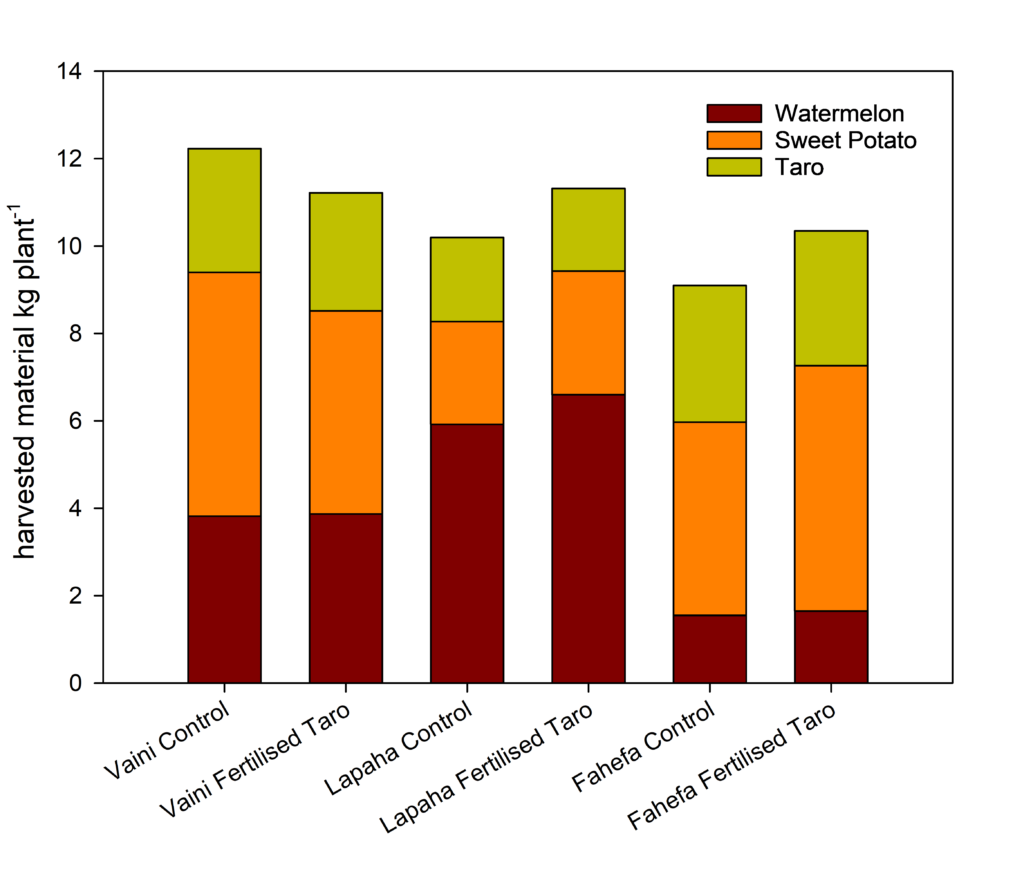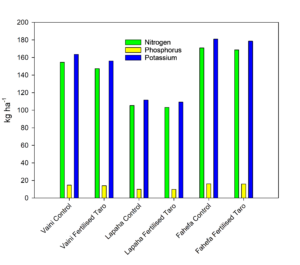Key results

Figure 1: Harvested plant material (kg/plant) from the watermelon, sweet potato, taro crops for field trials in Tonga. Treatments applied to the taro crop were the addition of fertiliser or no fertiliser (control).
Biggest achievements
- Successful completion of the field trials. This involved (1) growing a crop rotation comprising three crops on three different agricultural soils in Tongatapu, Tonga, (2) soil sampling and analysis of four soils, and (3) the development of a “Nutrient balance sheet” for the watermelon crop.
- The nutrient balance sheet showed that the fertiliser management practice currently used by farmers is very inefficient (~20-40% for nitrogen). This is strong evidence to encourage farmers to change their mindset and change their current fertiliser management practice to improve fertiliser use efficiency, increase yield and income. Reducing over-use of fertiliser can also reduce negative impacts on the environment.
- Completion of six training sessions with two groups of farmers (Eastern District and Nishi Trading) and Ministry of Agriculture and Food, Forestry and Fisheries Research and Extension staff.
- This will likely encourage good nutrient management, improve farmers and Ministry of Agriculture and Food, Forestry and Fisheries staff capacity in diagnosing plant nutritional disorders, and enable Ministry of Agriculture and Food, Forestry and Fisheries staff and farmers to test soil samples using Quick soil test kit (Palin test kit) and calculate fertiliser recommendation using the soil test results.
- Assisting with the development and launch of the Pacific Soil Portal.
- This will enable Tonga’s soil data to be available online for stakeholders including farmers, researchers, students.

Figure 2: Tonga trial taro corm and sucker nitrogen (N), phosphorus (P) and potassium (K) removal (kg/ha) estimated using relationships developed for Fiji taro. Treatments applied to the taro crop were the addition of fertiliser or no fertiliser (control).
Field trials
In Tonga, field trials involving one crop rotation of three crops (watermelon, sweet potato and taro) at three contrasting sites were successfully completed between 2018 and 2020. Site 1 had Vaini soil, Site 2 had Lapaha soil and Site 3 had Fahefa soil. The watermelon crop was planted between July and September 2018 and harvested between October and November 2018. The sweet potato crop was planted between February and March 2019 and harvested between November and December 2019. The taro crop was planted between February and March 2020 and harvested in November 2020. The watermelon and sweet potato crops received uniform management. Treatments applied to the taro crop were the addition of fertiliser (100g/plant NPK at planting (basal application) and 30g/plant urea 7 weeks after planting) or no fertiliser (control).
Plant and soil samples were sent to the Agriculture Chemistry Laboratory in Fiji for analysis, however, samples have not been analysed due to COVID-19 and laboratory shutdown. Due to COVID-19 travel restrictions, the team from the Ministry of Agriculture and Food, Forestry and Fisheries in Tonga ran the field trials largely independently.
There was no difference in taro yield between the control and the fertilised treatments at any site (Figure 1). Utilising the relationships developed for Fiji taro, removal of nitrogen, phosphorus and potassium by the taro crop were estimated (Figure 2). Results from the field trials indicated that nitrogen, phosphorus and potassium was not limiting taro yield.
Extension and outreach
| Location | Date | Audience | Topic |
| ‘Utulau | January 2021 | Nishi Trading growers | Nutrient budgets and soil health |
| Vaini Experimental Farm | February 2021 | Ministry of Agriculture and Food, Forestry and Fisheries staff | Nutrient budgets and soil health |
| Vaini Experimental Farm | February 2021 | Eastern District Watermelon farmers
|
Nutrient budgets and soil health |
| ‘Utulau | February 2021 | Nichi Trading growers | Soil test training |
| Éua | February 2021 | Government and growers | National Workshop on soil health |
| ‘Utulau | March 2021 | Nichi Trading growers | Soil test training |
| Vaini Experimental Farm | March 2021 | Ministry of Agriculture and Food, Forestry and Fisheries staff | National Workshop on soil health |
| Nuku’alofa | March 2021 | Representatives from research, government, growers’ groups, non-governmental organisations, and other key stakeholders | Soil test training |
| Haápai | March 2021 | Representatives from government and growers | National Workshop on soil health |
Science impacts
- The Nutrient Balance Sheet developed showed the inefficiency of the current fertiliser management strategy used by farmers.
- The leaching of nitrate down the soil profile (at 30 cm depth) was recorded in water samples collected from water infiltration devices (FullStop) installed at the field trial sites.
- To improve the efficiency of fertiliser management strategy we could use the “4R Stewardship Approach”
-
- The right source (type) of fertiliser
- The right amount of fertiliser to apply
- The time of application
- And the right place to apply fertiliser
- This requires soil testing and plant analysis using a soil testing laboratory, which is currently lacking.
Community impacts
- Economic: The knowledge farmers gained from training sessions will guide them to use fertiliser more efficiently to improve crop yield and in return increase their income and contribute to the nation’s economy. For example, most farmers do not use soil testing before growing their crops (e.g. watermelon, pumpkin). Most of them do not follow Ministry of Agriculture and Food, Forestry and Fisheries technical advice, especially the more experienced farmers who rely on their experience and have the mindset that the more fertiliser they apply the higher the yield. However, the balance sheet developed provide evidence that their current fertiliser management practice is very inefficient and costly. The availability of quick soil test kit provided guidance on how much fertiliser is needed by the crop and thus a suitable amount of fertiliser to use.
- Social: The increase in farmer’s income increases their ability to fulfil their social obligations. For example, to feed their family, improve their living standard, educate their children, fulfil churches responsibilities and other communities obligations.
- Environmental: Reduce over-use of fertiliser and improve its use efficiency. This reduces leaching of nitrogen down the soil profile that may contaminate underground water resource. It also could reduce nitrogen loss to the atmosphere through volatilisation, which contribute to greenhouse gas emissions.
Quotes from the community
-
“I can help some farmers in the future on how to identify particular nutrient deficiencies in the field and provide the with advice and recommendations on type of nutrients they require to add to the soils in terms of management” Project Assistant Tonga.
-
“Sometimes we confuse symptoms of plant disease and soil nutrient deficiencies, but from this training I developed my skills in diagnosing disease and I can tell the differences in nutrient deficiencies in soil and diagnosis of disease” Research Officer (Training beneficiary) Tonga.


















































